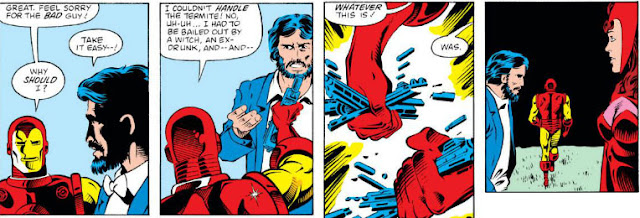As dramatic as the death of Gwen Stacy was in the pages of Amazing Spider-Man, there would be additional drama to be found in how her death would affect Peter Parker, her boyfriend who had grown to deeply love her. Long-time readers of the book had invested a lot in the character of Gwen, because we were witness to that growth for nearly every step of the way--and for Peter, whose life as Spider-Man was never a glamorous one and who seemed to be the poster boy for hard luck cases, Gwen was the one bright spot in his life, one of the few that seemed to have a good chance of giving him a shot at happiness.
 So when Gwen lost her life, it felt like a vacuum in these pages. Everything had changed so suddenly, and so many of the characters were at loose ends. Complicating matters was the death of Norman Osborn, whose identity as the Green Goblin was carefully hidden by a figure in the shadows. And there was Peter, who had to go on--not just as Peter, of course, but also as Spider-Man. Spider-Man still had books to sell, so Spider-Man couldn't just stay out of action due to grief. Yet when in action, Spider-Man couldn't be the same old quick-witted "Spidey," at least not for a while--because Peter had to come to terms with Gwen's death, and Spider-Man coming to terms with it while out adventuring was going to be a delicate balancing act.
So when Gwen lost her life, it felt like a vacuum in these pages. Everything had changed so suddenly, and so many of the characters were at loose ends. Complicating matters was the death of Norman Osborn, whose identity as the Green Goblin was carefully hidden by a figure in the shadows. And there was Peter, who had to go on--not just as Peter, of course, but also as Spider-Man. Spider-Man still had books to sell, so Spider-Man couldn't just stay out of action due to grief. Yet when in action, Spider-Man couldn't be the same old quick-witted "Spidey," at least not for a while--because Peter had to come to terms with Gwen's death, and Spider-Man coming to terms with it while out adventuring was going to be a delicate balancing act.There was a wealth of characterization to be mined while this situation played out, and there was arguably no better person to handle the book during this period than writer Gerry Conway, who had been the brainchild behind taking out Gwen in the first place but who consequently opened the flood gates to such good story material. I've made no secret of my opinion that Conway's writing style presents too heavy a mood for most comic books, and comics characters in particular. When Conway takes the reins of a title, you can almost see cloud cover moving over the lives of those characters--souring their mood with pessimism and bitterness and sapping the joy out of their lives for the duration, their dialog becoming tense and confrontational. But the very reasons Conway often makes for such a depressing read also make him the near-perfect choice for scripting Peter's state of mind following this kind of jolt that has caused such a change of course for him. And as readers, still in shock ourselves, Conway makes it possible for us to empathize with Peter on levels that might have eluded the style of writers less likely to probe so deeply.
So in that sense, issue #123--the first issue following Spider-Man's confrontation with the Goblin, and where Peter must start to truly deal with his feelings in the aftermath and try to begin to pull his life back together--this is where perhaps the real drama in this story hits. And as you can see by the cover, Conway has no intention of letting Spider-Man sit on the sidelines nursing the same wounds that Peter is dealing with.


















































